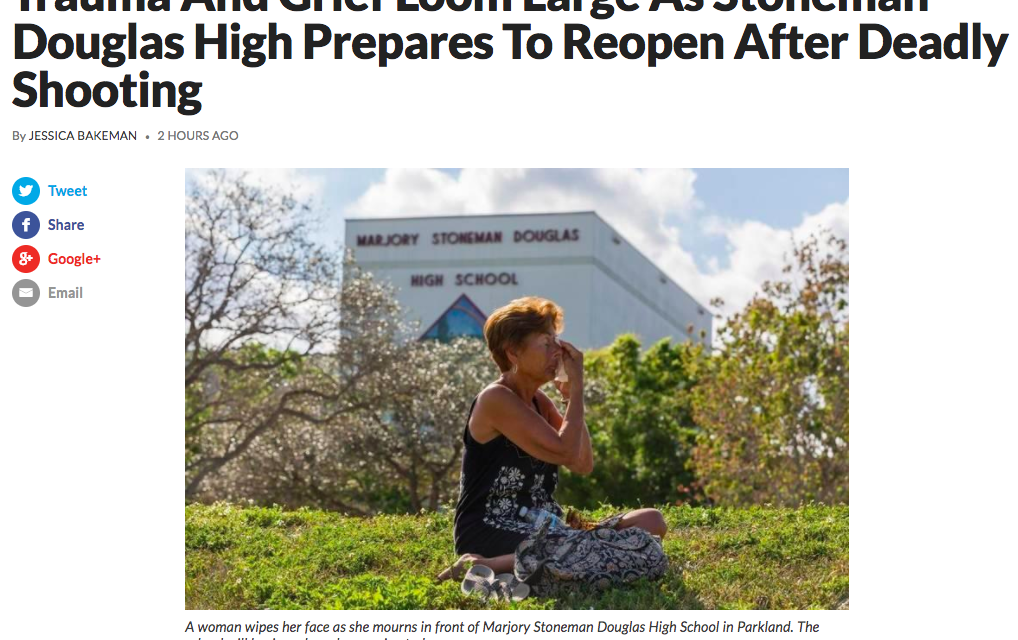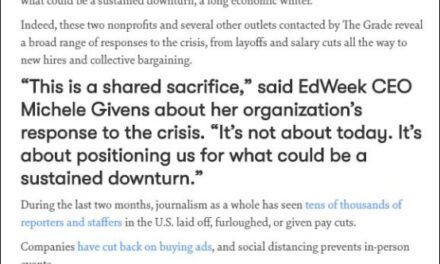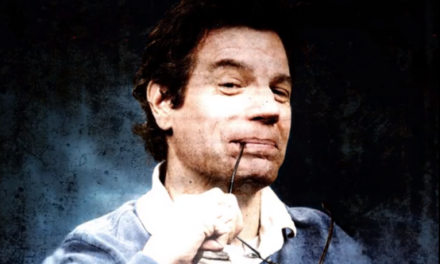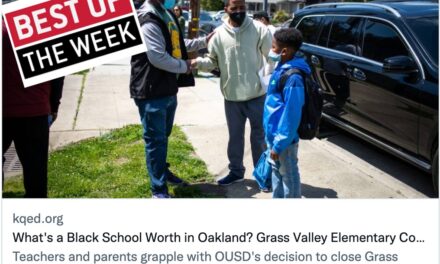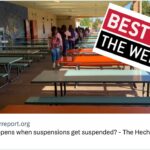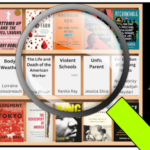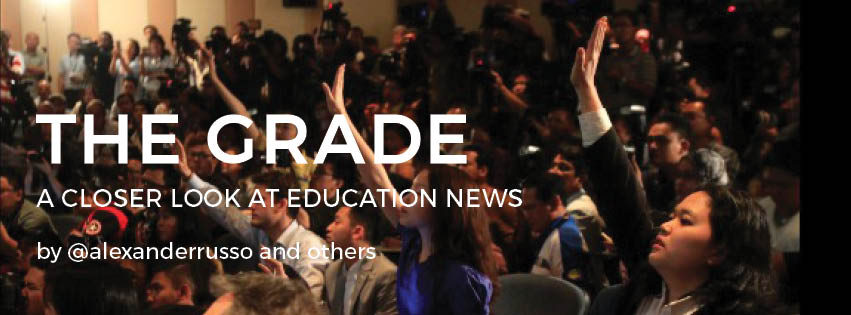
BEST OF THE WEEK

Image from a recent story from WLRN public radio about the return to classes at MSD high school today: Trauma And Grief Loom Large As Stoneman Douglas High Prepares To Reopen After Deadly Shooting
There was some pretty amazing journalism this week about the aftermath of the Parkland school shooting, including Emily Witt’s New Yorker piece (How the students of Marjory Stoneman Douglas High School founded a movement) and Julie Turkewitz’s New York Times coverage (School Shootings Put Teachers in New Role as Human Shields, Florida Students Began With Optimism. Then They Spoke to Lawmakers, and In School Shooting’s Painful Aftermath, Sheriff Faces Questions Over Police Response).
There were also some really helpful pieces like Education Week’s Here’s What Happened the Last Time Congress Considered School Shootings and the Washington Post’s Children have changed America before, braving fire hoses and police dogs for civil rights. This Naples Daily News piece about some of the many missed opportunities to prevent the troubled man from becoming a shooter stands out for me.
Other standouts:
WLRN: Family That Took In Parkland Shooter Got Him Therapy, Defends Letting Him Keep AR-15
USA Today: Cop stayed outside during Florida massacre while students died [see also EdWeek]
NPR: Student Journalists In Parkland
As in any fast-moving situation, the coverage wasn’t all strong. For more about that, scroll further down past Honorable Mentions.
HONORABLE MENTIONS
MISDEEDS IN CHICAGO AND HOUSTON
🏆 Chicago Sun-Times: CPS watchdog finds widespread pattern of unfair elementary admissions [See also WTTW Chicago public television and the Chicago Tribune]
🏆 NYT: Michael Feinberg, a founder of KIPP schools, is fired after misconduct claims [See also WSJ, Houston Chronicle, Chalkbeat]
ALL ABOUT TEACHERS
🏆 Vox: Kentucky teacher Linda Belcher wins special election [See also Daily Kos]
🏆 Washington Post: West Virginia teachers strike, closing all public schools
🏆 The 74: New Report Shows Charter Schools Less Likely to Be Unionized Than 6 Years Ago
🏆 NYT: How Elementary School Teachers’ Biases Can Discourage Girls From Math and Science
DEEP DIVES: CHICAGO AND LAUSD
🏆 WBEZ Chicago: How A Once Proud Chicago High School Hollowed Out
🏆 KPCC: LA’s notorious Locke High School is improving. Is it still ‘failing’?
CHALLENGES OF COVERING SCHOOL SHOOTINGS

There’s no shortage of advice for journalists about how to cover what happened last week, including this CJR piece (The stories we should be writing after the Parkland shooting) and this EWA overview (School Shooting in Florida Sparks Rethinking on News Coverage).
Inaccurate reporting remains a problem According to Politico, “ABC, AP and others ran with false information on shooter’s ties to extremist groups.” On Twitter, trolls and white supremacists had claimed that the shooter had ties to a Florida white supremacist group, but hours later, law enforcement said there was no evidence of such a connection.
The Washington Post ran a story about educators’ attempts to identify and address the school shooter’s needs, claiming that Cruz hadn’t slipped through the cracks. And, yes, the teen did not go unnoticed. But the article also shows educators trying and failing to help a kid — allowing him to transfer back to a standard high school, failing to refer him to law enforcement or coordinating with other agencies.
Be very careful about claiming “this is different” or that change is already happening on gun control, as this Daily Beast piece seems to do. Student advocates have already been brushed aside by the Florida legislature, and may face other setbacks and frustrations in their efforts. As noted in Vox, media coverage usually fades a week after a shooting. We’re only a few days past that.
The issue of depicting graphic injuries has bubbled below the surface all week, including this American Prospect piece noting that “the student videos spreading through social media are providing a much fuller photographic record than the news media will permit” and a NYT op-ed from the parent of a school shooting victim who says “perhaps the time has come to use” graphic pictures he and other parents have of their dead children. A doctor who treated some of the victims of the Parkland massacre wrote in The Atlantic that seeing the damage high power weapons do to human bodies would change the debate.
But news consumers rarely see any of this. In Slate, Jamelle Bouie wrote, “We are shown the aftermath, and sometimes—as with Parkland—we see victims hiding or escaping. But we don’t see what the bullets actually do.” The Times’ Nikole Hannah-Jones tweeted her agreement with the notion of showing graphic violence, “We should have done it with Sandy Hook. The media’s refusal to show this reality makes us complicit in the political refusal to act.”
11 ESSENTIAL BOOKS FOR EDUCATION JOURNALISTS
Montage of 11 books education reporters recommended for other education reporters.
This week’s column, 11 essential books for education reporters in 2018, attempts to answer the question “What’s the one book that every education reporter should read in 2018?”
Contributor Kristen Doerer posed that question to some of the top reporters in the field and received recommendations from an all-star lineup of journalists including the New York Times’ Erica Green, Baltimore Sun reporter Liz Bowie, USA Today’s Greg Toppo, freelance writer and author Amanda Ripley, veteran education reporter John Merrow, and Voice of San Diego’s Mario Koran.
Some of the books are familiar, and many (like Dave Cullen’s “Columbine”) are timely. A few are titles you might not have heard about, much less read (for example, Monique Morris’s “Pushout”). As Doerer notes, about half of the books suggested had to do with racial inequity, a topic that more and more education reporters are covering.
This trend was also noted by some of those she queried. “Education reporters are increasingly deconstructing a system that has not worked for children of color and really digging deeply into why that is,” says the NYT’s Erica Green in the piece. “For so long we were just taking the achievement gap on its face as an easy label for all these other societal factors.”
Thanks to everyone who participated. A special shout-out to Cara Fitzpatrick for getting the idea started and for recommending a book I’d never heard about.
What book would you recommend to help make someone an even better education reporter? As we quickly learned on Twitter, some education researchers and practitioners have a whole different set of books they think education reporters should read: “All the structural stuff those books look at neglect some very fundamental things that have been wrong at a practical level for a long time,” notes Eric Kalenze, who rallied others to come up with an alternative list.
MEDIA TIDBITS
📰 “Now I’ve seen it all,” said longtime Washington DC reporter Jeffrey Anderson about the fast-moving story that led to the resignation of DC schools chief Antwan Wilson. “The press is out for blood, and the teachers’ union is counseling restraint.”
📰 “There’s a danger of being desensitized,” says EdWeek’s Kathleen Kennedy Manzo in a BBC story about its new school shooting tracker. “You have to stop and think this is a big event.”
📰 Last week, a trio of education journalists who are closely involved with EWA described newsroom diversity statistics as disturbing. The trio calls on everyone “to help by pushing to recruit and retain journalists of color; examining the lens through which they see stories; and ensuring that newsroom cultures are truly inclusive.”
📰 Speaking of newsroom diversity: “Here I was, a black writer, being pressured by a white editor at a white publication [the Chicago Reader] to use a hate-filled word in a headline,” writes Chicago-based journalist Adeshina Emmanuel, whose work I have admired.
📰 If you’re new to the education beat, you have until April 10 to apply to EWA’s 4th annual boot camp usually held just before the national conference in LA.
📰 Check out the Educate podcast, a bi-weekly effort partnered with The Hechinger Report and distributed by The Atlantic that breaks down written pieces and gives them new angles, using reporters as sources on their own stories. Next week’s episode focuses on college’s that offer so-called “money-back guarantees” if students don’t find a job within a certain period after graduation.
📰 The media tends to focus on the negative, notes Steven Pinker in The Guardian. At roughly the same time, The Guardian launches The Upside, a new series focusing on good news, supported by the Skoll Foundation.
📰 Have you heard? (How could you not have.): Ryan Coogler and Michael B. Jordan’s next project is the education scandal film, #WrongAnswer, written by Ta-Nehisi Coates.
PEOPLE, JOBS, AWARDS, ETC.

Student profiled in Javier Hernandez’s 2014 Common Core story.
🔥 Hard to believe it, but nine years ago the NYT’s Javier Hernandez began covering NYC schools, a stint that culminated with his amazing 2014 piece Common Core, in 9-Year-Old Eyes (above).
🔥 If you haven’t already done so, follow KPCC’s Carla Javier, who helped report the story of the attempt to bring back Locke High School’s famous marching band.
🔥 EdSec DeVos continues to dodge the media. Although she was scheduled to speak at CPAC Thursday, “you won’t find that event on her public schedule,” noted US News reporter Lauren S. Camera.
🔥 All hail Angela Simmons, whose reporting on the Central 104 school district has “exposed teacher discrimination against African American students and retribution by the school board when parents spoke up,” according to CJR.
🔥 NPR correspondent Claudio Sanchez has a long history covering school violence. In a new piece, he looks back on decades of school shootings in America.
🔥 Meet Caity Coyne, a West Virginia Gazette “Report For America” reporter, who is writing about the teacher strike in West Virginia.
🔥 “No one tells you that 95% of being a reporter is sitting on the floor with your laptop and eating food out of your car,” notes the Herald Tribune’s Elizabeth Djinis.
🔥 “What I’ve learned as an education reporter,” says LA Times education reporter Sonali Kohli, is to “never underestimate young people who understand how they are being mistreated. They decide what we all will care about for the next generation.”
🔥 How great to meet journalists like The 74’s Kate Stringer and APM’s Alex Baumhardt in real life (at EWA’s New Orleans event on social and emotional learning) last week, and to see so many familiar faces from over the years like Dale Mezzacappa and Charles Lussier.
🔥 So long, St. Louis today reporter Ashley Jost, who says she’s headed to the University of Missouri as a senior advisor for critical issues in higher education.
This is the web archive version of the weekly newsletter, Best of the Week, which comes out on Fridays. Sign up here to get it first.
KICKER
Check out the new Independent Lens documentary, Tell Them We Are Rising. For more on the film, and the history of HBCUs, see also this writeup from Vox. You can watch the entire documentary here.
ABOUT THE AUTHOR

Alexander Russo
Alexander Russo is founder and editor of The Grade, an award-winning effort to help improve media coverage of education issues. He’s also a Spencer Education Journalism Fellowship winner and a book author. You can reach him at @alexanderrusso.
Visit their website at: https://the-grade.org/

